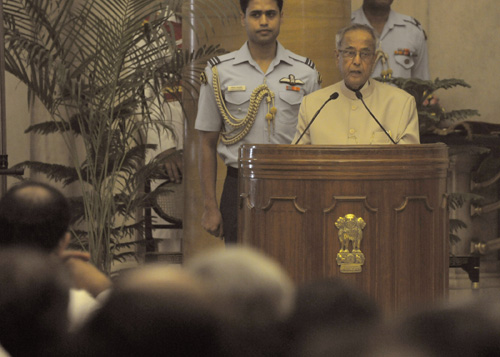
I am delighted to receive the Second annual 'Report to the People' of the National Innovation Council. The Council, with eminent personalities from diverse walks of life, was constituted to realise the vision of the Government of shaping the next decade as India's 'Decade of Innovation'.
In an era marked by rapid technological advancements, 'Innovation' is the key driver of growth and development. An innovative approach becomes even more imperative in our context, where there is a huge reservoir of unmet needs in areas such as health, education, water, food security and energy. Innovation can provide solutions to such challenges and, in the process, also enable many more people to harness the gains from India's growth story.
India has tremendous untapped potential for innovation. Not only does our demographic dividend and thriving democracy provide fertile ground for innovation, but our population of 550 million persons aged below 25 makes it imperative that we innovate to meet their needs in a sustainable manner, while also creating new opportunities for them.
As brought out by the National Innovation Council in its 'Report to the People', we have to evolve our own model of development - which must be based on our unique needs and challenges, especially the challenge of equitable growth. The prime focus has to be on affordability, sustainability and scalability. India today needs to innovate products and services that are affordable and which do not compromise on either efficiency or quality. This model of innovation must pervade our working environment if we are to truly empower people of our nation. It can also serve as a model of sustainable development for the rest of the world.
I am happy to note that the National Innovation Council has undertaken several initiatives to set the country firmly on the path to innovation, with a special focus on inclusive growth. The Council has been working towards creating mechanisms to finance innovative enterprises focussed at the bottom of the income pyramid and is geared to launch the India Inclusive Innovation Fund. The Fund is proposed to be operationalised with an initial corpus of Rs. 500 crore. Government of India has already made a provision for allocating Rs. 100 crore as seed money for the Fund.
India has an estimated 5,000 small and medium scale regional industry clusters which are unable to utilize their full potential and whose productivity needs to be optimised. The National Innovation Council has been working towards seeding innovations in these industry clusters, while focussing on small and medium enterprises, by facilitating the creation of Industry Innovation Clusters to drive job creation and productivity. The Ministry of Micro, Small and Medium Enterprises and the Council of Scientific and Industrial Research are also supporting the National Innovation Council in this effort. We look forward to the results of these interventions in enhancing the innovation quotient of the clusters and in boosting job creation.
Inculcating and promoting the spirit of innovation in educational institutions can lay the groundwork for enhancing the impact of innovation in society and in realising our demographic dividend. National Innovation Council has also been taking steps to nurture innovation in schools and colleges through improvements in curriculum, spotting talented innovators among students, and awarding Innovation Fellowships. The Council is also working closely with the Ministry of Human Resource Development to give shape to these initiatives. I am pleased to learn that the Ministry plans to launch 1,000 scholarships under the National Innovation Scholarship Scheme from the academic year 2013.
I am told that the National Innovation Council and the Ministry of Human Resource Development have been working together towards the creation of a Meta University, as a global first. The Meta University will ride on the National Knowledge Network and will promote multi-disciplinary learning. I am happy that the Ministry has already facilitated the establishment of a Meta University in Delhi, in which Jawaharlal Nehru University, Jamia Milia Islamia, Delhi University and Indian Institute of Technology Delhi are participating.
I am happy to know that Ministry of Communications and Information Technology is working on the rural broadband plans of the Government, which aim to connect all 250,000 panchayats in the country on a broadband network. This rural broadband network will constitute an unprecedented opportunity for unleashing grassroots innovation by empowering rural citizens not only through access to information, but also through relevant applications in areas such as education, health and skill development.
While innovation is a result of networks and collaborations among multiple actors, Governments can play a key role in facilitating the right enabling framework in which these actors can interact. The National Innovation Council too has been working to create an institutional framework for promoting innovations in Government by facilitating the setting up of State Innovation Councils in each State, and Sectoral Innovation Councils aligned to Union Government Ministries. I am hopeful that this will encourage various arms of the Government to think out of the box.
I compliment Mr Pitroda and his team at the National Innovation Council for these pioneering initiatives. I also appreciate the full support that the Ministry of Communications and Information Technology has extended to the Council's endeavours. I wish the National Innovation Council all success as it goes forward in its task of catalysing innovation in the country.
